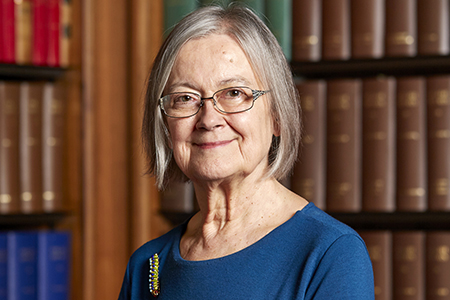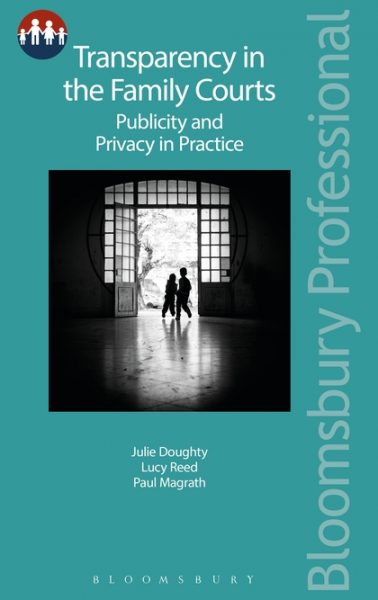Weekly Notes: legal news from ICLR – 14 May 2018
Our weekly roundup of legal news and commentary returns after a fortnight’s gap while we attended a conference in Darwin and other events in Australia. This week’s selection has a lot about family law, for reasons that will become apparent; also immigration, legal aid in criminal cases, freedom of information, court reform, and copyright. Family
Our weekly roundup of legal news and commentary returns after a fortnight’s gap while we attended a conference in Darwin and other events in Australia. This week’s selection has a lot about family law, for reasons that will become apparent; also immigration, legal aid in criminal cases, freedom of information, court reform, and copyright.

Family law
Hale on transparency
Giving the inaugural Sir Nicholas Wall Memorial Lecture at Gray’s Inn on 10 May 2018, Baroness Hale of Richmond discussed the topic of Openness and Privacy in Family Proceedings.
The speech began by covering ground which should be very familiar to anyone who has been working in or reading about cases in the Family Division under the presidency of Sir James Munby and his predecessor, Sir Nicholas Wall, and/or who has been following the work of the Transparency Project and its myth-busting blog posts, and/or has been lucky enough to get a copy of that recently published book, Transparency in the Family Courts (by Doughty, Reed and Magrath, Bloomsbury Professional, 2018).*
In other words the question was how, mainly to protect the interests of children involved or affected by the cases, should the courts balance the need for privacy (including anonymity) against the public interest in open justice and better understanding of what the courts are doing in the public’s name.
But then there was a twist:
“However, while thinking about the balance between privacy and publicity, we should not forget that article 8 is not the only privacy-protecting game in town. There is also the General Data Protection Regulation, with the accompanying Data Protection Bill, due to come into force on 25 May.”
Although at first blush it might look as though data rights under GDPR might trump those of freedom of expression, Lady Hale seemed to conclude that the balance would still need to be struck between privacy and the public interest in much the same way as under the European Convention on Human Rights.
The speech was live tweeted by CJ McKinney:
Here we are in Gray's Inn and it's time for some Lady Hale content. She is delivering the Sir Nicholas Wall Memorial Lecture shortly pic.twitter.com/5YLfK0Yafz
— Conor James McKinney (@mckinneytweets) May 10, 2018
According to a recent post on Legal Cheek, “Lady Hale is the Beyoncé of the legal profession. This week’s An Exclusive Evening With Baroness Hale event at the Supreme Court helped us to understand why this is.”
*ABOUT THAT BOOK: see New book on transparency published by Transparency Project trustees One of the trustees is ICLR’s own Paul Magrath. Royalties from the book will be donated to The Transparency Project. It’s OUT THIS WEEK. Need we say more?

Courts reform
Munby on the Reform Programme
Sir James Munby, President of the Family Division, gave an upbeat update on the progress of the HMCTS Reform programme, which is currently transforming the fabric and practice of the courts. Reform for the Family jurisdiction: A message to family judges from the President of the Family Division
The update, reported in Family Law news, covers digital technology, estate reform, case officers, as well as broader changes in support of Reform, and the role of the senior judiciary, including that of the Family Division, in planning and supervising the changes.
Online divorce
Among the new developments is an online divorce application process (which no longer requires you to print out the resulting application form and send it off with a cheque):
Another milestone in our modernisation of courts and tribunals. Digital divorce application is now live on https://t.co/HATlMJKyL6 – just one way we’re making access to justice easier for all: https://t.co/jzChtZ4TZE #CourtReform pic.twitter.com/DCvDAv7YRn
— Susan Acland-Hood (@CEOofHMCTS) May 6, 2018
But not everyone is quite so enthusiastic about the simplified language used in the process:
New @HMCTSgovuk online divorce service still uses misleading wording. As I said in my @GreshamCollege lecture (Feb), most men would find it intolerable to live with their wives and their wives’ lovers. But the test is whether a man finds it intolerable to live with HER — not THEM pic.twitter.com/H2olmyuBnT
— Joshua Rozenberg (@JoshuaRozenberg) May 6, 2018
Lost jobs
Munby’s update may in fact be part of a consultation process by senior judiciary which the Guardian reported in an article about the Reform programme that suggested up to 6,500 back room jobs might be lost in the modernisation of the courts between 2016 and 2022. It said “Details of the ambitious extent of the £1bn programme launched in 2016 emerged from a consultation process circulated by the senior judiciary” which was issued at the end of April.
“The senior judiciary has sent around four large documents explaining how the switch to digital working will affect the criminal, civil and family courts as well as tribunals. Feedback is being sought from judges.”
The Daily Mail covered the same developments with what looks like a mixture of old news about ‘pop up’ courts in pubs with more recent material, in Called to the bar! Legal cases could be held in pubs and hotels in towns where court buildings are to shut down as part of a £1billion trials revolution
The report notes that “Pop-up courts had been publicly trialled two years ago by the chief family judge, Sir James Munby, who suggested they could be set up in pubs.” But it suggests that the idea has been confirmed in more recent consultation reports by the senior judiciary. We remain sceptical, but would be glad of a link to or sight of this material, if it exists.
Immigration
Windrush debate
Prompted by a petition launched by Patrick Vernon OBE and signed by more than 178,000 people in a few days, the House of Commons Petitions Committee debated the proposal for an Amnesty for anyone who was a minor that arrived In Britain between 1948 to 1971.
Though there was a good deal of the usual blame-game point scoring between the parties, the debate included some fine speeches, including one from David Lammy. You can read the debate on Hansard.
Or you can watch it via Parliament.tv:
Legal Aid
Criminal barristers continue action over legal aid fees
On 8 May 2018 there was a debate in the House of Commons on Criminal Legal Aid.
Richard Burgon, shadow justice secretary, moved
“That the Criminal Legal Aid (Remuneration) (Amendment) Regulations 2018 (SI 2018/220), dated 20 February 2018, a copy of which was laid before this House on 23 February, be revoked.”
But the debate concluded in a vote in which that motion was defeated by 300 votes to 252.
The AGFS or Advocates Graduated Fees Scheme has been widely rejected by criminal legal aid practitioners. The scheme was designed to be cost-neutral, but to distribute funds more appropriately towards the persons doing the work. However, it has failed to gain acceptance as offering fair and appropriate remuneration for the work involved. (See, for example, Law Society Gazette, Profession calls for properly funded legal aid system after advocacy fee reform)
Over the last few weeks many chambers have refused to accept new legal aid work. They will now also be refusing to accept returns (ie briefs returned to the instructing solicitor by practitioners who are unable to take on the work and farmed out to another practitioner or set of chambers).
In the wake of the Commons Defeat, the Criminal Bar Association put out the following announcement on 9 May:
“You are well aware of our announcement of the 29th March 2018 recommending that members consider not taking work under 1st April 2018 representation orders and the reasons behind this. Many of you have taken this stance.
We now consider it is necessary to escalate this action in order to show that we really have reached breaking point as we said at last night’s event and have been saying for many years.”
Three specific forms of action are now being urged on members:
“1. To continue to refuse instructions on all cases subject to a representation order dated on or after 1st April 2018 and;
2. To operate a “no returns” policy on all cases from the 25th May 2018. There is a protocol linked to this announcement, which will assist members when arranging their professional diaries and;
3. Take part with other organisations involved in the Criminal Justice system in targeted Days of Action to highlight the crisis in the system. Dates and details of such action will be notified to members privately.”
There is a No Returns Protocol
The View from the North blog has a post entitled We Are Right by Manchester barrister @jaimerh354 explaining why the protests are likely to continue. He says:
“I support the action proposed by the CBA. I support it to the hilt. I have now been at the Bar for 25 years. Not once in that time has a single fee for work done ever been increased due to inflation. We have had different ways of being paid, different versions of different ways of being paid and then brutal cuts to fees that the Government had previously decided were appropriate remuneration.
That is 25 years of being undervalued and being treated with contempt.”
His argument is that the MOJ have not redesigned the fees system for the modern age, but have simply taken archaic elements of an outdated system and rearranged them in a different way, without any more funding. He urges the judiciary, who may have enjoyed better remuneration and lesser workload during their years of practice, to view the protests with sympathy and not through the lens of MOJ spin.
Freedom of Information
Government report on LIPs leaked
Buzzfeed reports that the MOJ has been caught out trying to pretend a six-page summary of research on the views of judges about litigants in person in criminal courts, which it reluctantly produced in response to an order by the Information Commissioner on an FOI appeal, was the whole report when in fact there was a much more detailed, and damaging, report prepared.
The research, based on in-depth interviews with 15 crown court judges and six prosecutors, had been commissioned by the MOJ as part of its review into the effects of the Legal Aid, Sentencing and Punishment of Offenders Act 2012 (LASPO), which came into force on 1 April 2013. The ministry is belatedly conducting a long-promised review, due to be completed by the end of [insert current year]. Buzzfeed issued a Freedom of Information request for the research but was turned down on the grounds that it related to the formulation of government policy. The ICO rejected that and ordered the MOJ to disclose the research.
Emily Dugan reported the original report here: The Government Tried To Bury This Research Showing Judges’ Concerns About The Rise In People Defending Themselves In Court
This showed that judges and prosecutors were very concerned about litigants in person appearing in criminal cases with little or no understanding of what was going on or how to represent themselves effectively. But the report disclosed initially turned out to be only a summary of something much more comprehensive and damaging. The full report was leaked to Buzzfeed, which is one of three parties who have now reported the MOJ to the ICO for potentially breaching FOI laws.
In The Government Has Been Reported To The Information Commissioner Over A Report Leaked To BuzzFeed News, Dugan now writes:
“In statements to BuzzFeed News, the department repeatedly claimed that the summary was the full and only report in existence. In contrast, the full document leaked to BuzzFeed News, dated February 2016, is clearly titled a “report” and has footnotes, appendices, data and quotes. Intentionally concealing a report that should be disclosed is a potential offence under section 77 of the Freedom of Information Act.
Dugan’s reporting of legal aid cuts for Buzzfeed, first in relation to civil and family law cases, and now in relation to criminal cases, has been superb and unflinching. She deserves a prize.
A handy list of her articles on legal aid is included by Gordon Exall, in a post on his Civil Litigation Brief, Litigants in person and Freedom of Information: Ministry of Justice could be on the naughty step
Dates and Deadlines
Bloomsbury Professional Family Law Conference
Transparency, children’s evidence and sharing within matrimonial law are just some of the major topics family lawyers are grappling with today. (Read the Foreword written by Rt Hon Sir Andrew McFarlane on transparency) Full programme here. Speakers include Lucy Reed of the Transparency Project, and David Burrows, who regularly contributes to the ICLR blog.
Event takes place at Gray’s Inn, on Wednesday 16 May. Booking details via Eventbrite .
London legal walk 2018
Team ICLR will be among the many on a sponsored walk to raise funds for free legal advice for the needy, on Monday 21st of May 2018. The annual walk is organised by the London Legal Support Trust.
The ICLR team includes: Clive Scowen (Editor), Georgina Orde, Isobel Collins, Susanne Rook, Celia Fox, Nicola Berridge, Sharene Dewan-Leeson, David Cosway, Nicky Sears.
Read about previous walks here.
You can contribute to our fundraising page here: https://uk.virginmoneygiving.com/ICLR2018
Lecture: Transparency in the Family Court: What goes on behind closed doors?
Another in the excellent series at Barnard’s Inn Hall by Gresham Professor of Law, Jo Delahunty QC
6 pm Thursday 24 May.
No reservations are required for this lecture. It will be run on a ‘first come, first served’ basis.
Doors will open 30 minutes before the start of the lecture.
Law (and injustice) from around the world
America
Simian intellectual property claim defeated
The US Court of Appeals for the 9th Circuit has affirmed the decision of a federal district judge in San Francisco that Naruto, a “crested macaque,” does not have legal standing to file a copyright claim against a nature photographer, as Naruto is not a person. Nor could the animal rights advocacy group PETA (People for the Ethical Treatment of Animals) maintain the claim it sought to advance on Naruto’s behalf, appointing itself the plaintiff’s ‘next friends’.
According to the published opinion of the majority of the panel
“… the animal had constitutional standing but lacked statutory standing to claim copyright infringement of photographs known as the ‘MonkeySelfies’…
And
… the monkey lacked statutory standing because the Copyright Act does not expressly authorize animals to file copyright infringement suits.”
The background to the claim is explained in a footnote to the minority opinion (only partly concurring) of Circuit Judge NR Smith, at p 39:
“In 2011, Slater (a photographer) went to the Tangkoko Reserve in Indonesia and setup a camera. Naruto, a crested macaque, pushed the shutter. Slater and Wildlife Personalities subsequently included the photographs in a book published by Blurb. In 2015, PETA—with no evidence it has any relationship whatsoever to Naruto—brought the instant suit claiming that Slater, Wildlife Personalities, and Blurb had violated Naruto’s rights under the Copyright Act.”
In fact the claim had already been settled on the basis that Slater donate a portion of proceeds from books sales featuring the images to the Tangkoko Reserve. So the court’s ruling was concerned with jurisdictional issues, unresolved by the settlement, rather than liability.
The case has been reported in Ars Technica: Monkey-selfie lawsuit finally ends: Court affirms adorable macaque can’t sue
We previously covered it here in Weekly Notes – 8 August 2014
And in Weekly Notes – 27 November 2015
And here, sans copyright, but with ample attribution, and probably saying “cheese”, is Naruto:

That’s it for now. My thanks to all who led me to stories, mostly my followees on Twitter.
This post was written by Paul Magrath, Head of Product Development and Online Content. It does not necessarily represent the opinions of ICLR as an organisation.